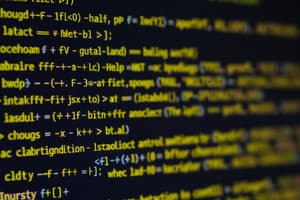Podcast
Questions and Answers
What type of statement is used to incorporate relational operators in C++ programs?
What type of statement is used to incorporate relational operators in C++ programs?
- If statement (correct)
- Switch statement
- While loop
- For loop
In C++, what is the purpose of an if statement?
In C++, what is the purpose of an if statement?
- To test a condition and execute different code based on the result (correct)
- To create a class
- To loop through a block of code
- To define a function
Which part of an if statement must the condition be enclosed in?
Which part of an if statement must the condition be enclosed in?
- Quotes
- Parentheses (correct)
- Curly braces
- Square brackets
What type of comparison is a==d in the context of C++ programming?
What type of comparison is a==d in the context of C++ programming?
If an if statement contains only one statement following it, when are braces required?
If an if statement contains only one statement following it, when are braces required?
What is the purpose of the block of code that follows an if statement?
What is the purpose of the block of code that follows an if statement?
What type of programs are known as data-driven programs?
What type of programs are known as data-driven programs?
Which statement is true about data-driven programs?
Which statement is true about data-driven programs?
Why might you not want a computer to print every employee's paycheck for every pay period?
Why might you not want a computer to print every employee's paycheck for every pay period?
What is the purpose of using relational operators in data-driven programs?
What is the purpose of using relational operators in data-driven programs?
In data-driven programs, what dictates what the program does?
In data-driven programs, what dictates what the program does?
Why is it important for data-driven programs to not execute the same way every time?
Why is it important for data-driven programs to not execute the same way every time?
How does C++ behave when the condition in an if statement is False?
How does C++ behave when the condition in an if statement is False?
How would you best summarize the behavior of an if statement in C++?
How would you best summarize the behavior of an if statement in C++?
What is the purpose of using an if statement in C++?
What is the purpose of using an if statement in C++?
When does the block of statements following an if statement execute in C++?
When does the block of statements following an if statement execute in C++?
In which scenario does an if statement in C++ not execute the block of statements?
In which scenario does an if statement in C++ not execute the block of statements?
Study Notes
Relational Operators and Conditional Execution
- Relational operators examine literals and variables in a program and operate accordingly
- They are used to create decision statements that test relationships and make decisions about which statement to execute next
The if Statement
- The if statement is used to incorporate relational operators in C++ programs
- It allows for conditional execution, enabling the program to test for a condition and branch to different parts of the code depending on the result
- The simplest form of an if statement is:
if (condition){ Statements; } - The condition must be enclosed in parentheses and can include any relational comparison
- If the condition is True, the block of statements inside the braces executes; otherwise, it is ignored and the program continues to execute the next statement
Data-Driven Programs
- Data-driven programs are programs that don't always execute the same way every time
- They are controlled by data, which dictates what the program does
- Relational operators are used to conditionally control other statements, making it possible to create data-driven programs
How if Statements Work
- An if statement can be read as: "If the condition is True, perform the block of statements inside the braces. Otherwise, the condition must be False; so do not execute that block, but continue executing the remainder of the program as though this if statement did not exist."
- The block of statements following the if executes only if the condition is True
- If the condition is False, C++ ignores the block and executes the next statement in the program
Examples of if Statements
if (bigNumber > smallNumber) { bigNumber = smallNumber; cout << "bigNumber is now smallNumber"; }if (expression){ statement1; statement2; statement3; }
Studying That Suits You
Use AI to generate personalized quizzes and flashcards to suit your learning preferences.
Description
Explore the concepts of control structures in C++ programming language including the if statement, if..else statement, and the Switch Statement. Test your understanding with exercises included in the lecture content.




